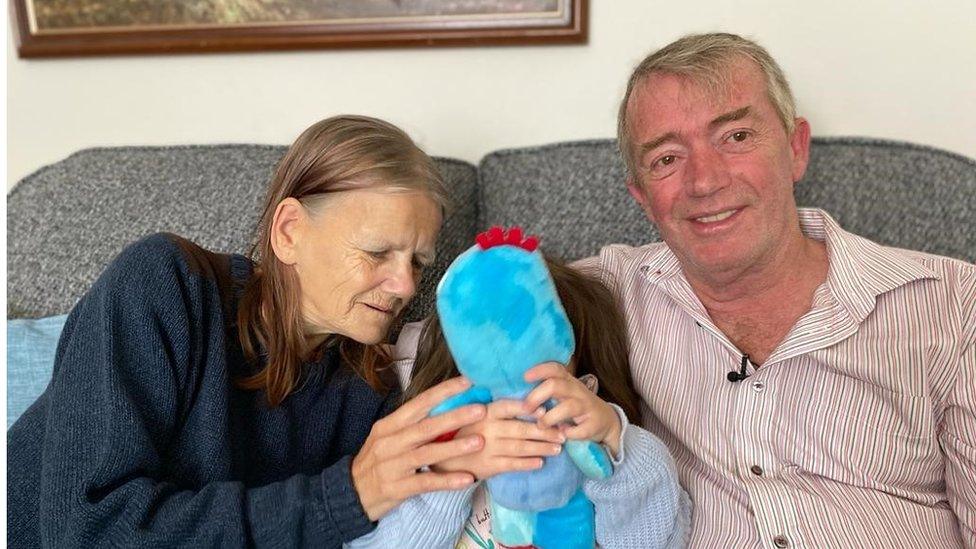Disabled girl's grandad carer cannot afford haircut after giving up work
- Published

Alan, his wife Julie and granddaughter Ella
A man who had to give up work to care for his disabled granddaughter says he has been left with so little money he struggles to afford a haircut.
Alan, from Pudsey in Leeds, has been a "kinship carer" for six-year-old Ella, who has the genetic condition Charge Syndrome, since she was 10 months old.
He gets £150 a week from his local authority, but if he was recognised as a foster parent, he would receive more.
Alan added he was so worried about money it was "eating away at him".
A kinship carer is a relative or family friend raising a child because their parents cannot.
Leeds City Council pays foster parents for children of Ella's age at least £174.10 a week but that could be up to £235.64 depending on the child's needs.
According to a new report by the charity Kinship, external, about 19,000 vulnerable children are at risk of being put into care because their kinship carers do not have adequate financial support.
'Things have been difficult'
A spokesperson said: "Unlike foster carers, most kinship carers do not receive a financial allowance from their local authority."
Ella's condition affects her ability to walk and talk and she is also tube-fed.
Alan told the BBC that while they were managing now, as Ella got older and bigger, they would need more money.
He said: "I used to be self employed and was able to put bread on the table but did not earn enough to have any savings.
"Since giving up work things have been difficult.

Alan has been Ella's full-time carer since she was 10 months old
"It's hard - if I want a haircut I have to save for three weeks. We work on a very tight budget."
The Kinship report also found that more than a quarter of kinship carers said they were "at crisis point" while one in 10 said their household had run out of food within the previous two weeks.
There are more than 162,000 children being raised in kinship care in England and Wales, twice the number in foster care.
According to the National Fostering Group, external, foster carers can receive up to £24,500 a year per child.
Meanwhile, kinship carers are entitled to child benefit and child tax credits but overall financial responsibility remains with the parents.
However, local authorities do have the power to sometimes allocate an allowance to kinship carers, the charity said.
Kinship's CEO, Dr Lucy Peake added: "We know, as a society, that what children need is love, so it is deeply wrong to risk children in kinship care being separated from a stable home with people who love them, simply because the system is not set up to provide support for kinship carers the way it is for foster carers."
Leeds City Council executive member for children and families Councillor Fiona Venner said: "Kinship carers received the same uplifts as our non-kinship carers last year and have the same offer of financial and non-financial support.
"Given the current financial challenges facing all families, our finance panel regularly reviews and responds positively to requests, especially to support children with complex health needs."

Follow BBC Yorkshire on Facebook, external, X (formerly Twitter), external and Instagram, external. Send your story ideas to yorkslincs.news@bbc.co.uk, external.
Related topics
- Published2 October 2023

- Published2 October 2023

- Published2 October 2023
